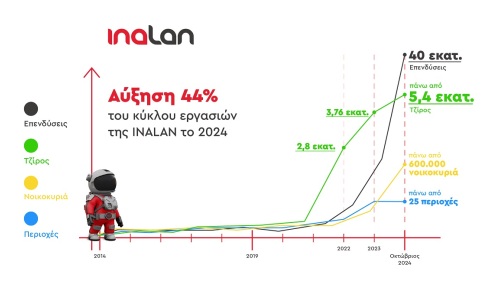
Goldman Sachs sees a coalition government
Goldman Sachs sees a coalition government
Goldman Sachs speaks of a “fluid political environment that will promote a new coalition rule in Greece” in its latest report...

UPD:
Goldman Sachs speaks of a “fluid political environment that will promote a new coalition rule in Greece” in its latest report, and adds another voice of direct intervention in the internal affairs of the country in view of the forthcoming elections.
In a report, Goldman Sachs considers it unlikely that “ there will be a radical change in Greek politics after the elections of May 6th” and believes that both the electoral act and the “fragmentation of the opposition and the chances of errors in the polls” will not allow for the emergence of "unstable" political forces.
According to the company and its analysts, the Greek political scene has undergone significant changes, with the main feature being that the “traditional” separation between the center-left - PASOK - and center right - ND - is no longer the main dilemma for Greek voters.
Citing recent polls, analysts at Goldman Sachs estimate that the dissent of voters is so great that while PASOK and ND used to gather percentages reaching 80%, they now gather up to 40%, something which opens up the way for small and new parties to enter parliament.
This is what has raised concerns in markets; analysts say that the result of elections could lead to an “anti- European government that would disrupt efforts to adapt and create risks to economic stability”.
However, Goldman believes that this is unlikely to happen due to the bonus of 50 seats to the top party, which allows PASOK and ND to cooperate and form a government, while opposition parties are many and of various opinions and undecided voters can create an error margin in the finalized actual polls.
In a report, Goldman Sachs considers it unlikely that “ there will be a radical change in Greek politics after the elections of May 6th” and believes that both the electoral act and the “fragmentation of the opposition and the chances of errors in the polls” will not allow for the emergence of "unstable" political forces.
According to the company and its analysts, the Greek political scene has undergone significant changes, with the main feature being that the “traditional” separation between the center-left - PASOK - and center right - ND - is no longer the main dilemma for Greek voters.
Citing recent polls, analysts at Goldman Sachs estimate that the dissent of voters is so great that while PASOK and ND used to gather percentages reaching 80%, they now gather up to 40%, something which opens up the way for small and new parties to enter parliament.
This is what has raised concerns in markets; analysts say that the result of elections could lead to an “anti- European government that would disrupt efforts to adapt and create risks to economic stability”.
However, Goldman believes that this is unlikely to happen due to the bonus of 50 seats to the top party, which allows PASOK and ND to cooperate and form a government, while opposition parties are many and of various opinions and undecided voters can create an error margin in the finalized actual polls.
In any case, the company warns that even if there is a coalition government formed, its success will depend on whether it has a large majority and whether members are “experienced, with strong technical backgrounds, reformist attitudes and credibility”…
Whatever the outcome, the success of a coalition government is judged to be necessary for financial and political stability in Greece.
At the same time another giant of the finance industry, Nomura, published a report on political developments in the north and south of the Eurozone, which it believes may “determine the future of the Eurozone”.
Especially in Greece, Nomura analysts believe that PASOK and ND will not be able to gather a majority of 151 seats. The company sees 160 seats as the basis of a stable government.
With this data, it believes that political uncertainty will continue even if ND and PASOK are able to form a coalition government, doubting their ability to succeed in the new memorandum’s goals.
This is while in Brussels or the IMF headquarters they do not hide their concern about the outcome of the upcoming elections.
The EC now, although restrained from publicly expressing a specific stance, is obviously worried about the pre-election promises of leaders and the possibility of anarchy and another election…
Whatever the outcome, the success of a coalition government is judged to be necessary for financial and political stability in Greece.
At the same time another giant of the finance industry, Nomura, published a report on political developments in the north and south of the Eurozone, which it believes may “determine the future of the Eurozone”.
Especially in Greece, Nomura analysts believe that PASOK and ND will not be able to gather a majority of 151 seats. The company sees 160 seats as the basis of a stable government.
With this data, it believes that political uncertainty will continue even if ND and PASOK are able to form a coalition government, doubting their ability to succeed in the new memorandum’s goals.
This is while in Brussels or the IMF headquarters they do not hide their concern about the outcome of the upcoming elections.
The EC now, although restrained from publicly expressing a specific stance, is obviously worried about the pre-election promises of leaders and the possibility of anarchy and another election…
UPD:
Ακολουθήστε το protothema.gr στο Google News και μάθετε πρώτοι όλες τις ειδήσεις
Δείτε όλες τις τελευταίες Ειδήσεις από την Ελλάδα και τον Κόσμο, τη στιγμή που συμβαίνουν, στο Protothema.gr
Δείτε όλες τις τελευταίες Ειδήσεις από την Ελλάδα και τον Κόσμο, τη στιγμή που συμβαίνουν, στο Protothema.gr
ΡΟΗ ΕΙΔΗΣΕΩΝ
Ειδήσεις
Δημοφιλή
Σχολιασμένα






































